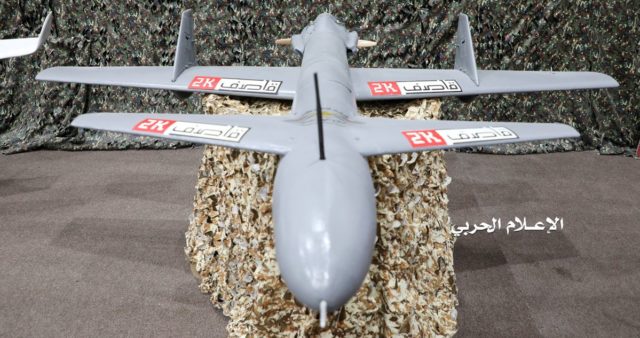Yemen’s Houthi rebels launched a series of attacks against the United Arab Emirates capital of Abu Dhabi Monday, escalating tensions between the Iranian-backed group and the Gulf States.
A spokesman for the Houthis claimed the group fired five ballistic missiles and a series of drones at the UAE. The assault damaged a construction site at Abu Dhabi international airport and briefly disrupted flight operations. The drones also started a fire at an oil depot near Musaffah, killing three migrant workers. Monday’s attack is the first Houthi operation against targets inside the UAE. Saudi Arabia also intercepted eight rebel drones, according to a government statement.
In retaliation, a Saudi-led coalition launched airstrikes against Houthi camps and infrastructure in Yemen Tuesday, the largest such bombardment in over three years. The campaign killed Houthi Brigadier General Abdullah Qassem al-Junaid, head of the group’s aviation academy. According to local media, 19 other people died in the attacks around the capital Sanaa.
A wide range of international actors condemned the latest Houthi provocation, including the U.S., Israel, and the EU. The international community has also criticized the rebel group’s hijacking of an Emirate-flagged ship, the Rwabee, two weeks ago shortly before it attempted to unload aid for civilians in the war-torn country.
This week’s attack comes amid slow progress fighting the militia on the ground. Since the beginning of the year, Yemeni government forces with the Emirati-backed Giants Brigades took control of the Shabwa province from the Houthis. The energy-rich region is a stepping stone to take back Marib, a central city that is home to millions of people and a point of leverage for the Houthis at UN-sponsored peace talks.
While the coalition grinds on inside Yemen, the proliferation of sophisticated Iranian-supplied weaponry has sparked continued worry for U.S. allies in the region. High-tech drones and missiles allow Houthis to launch accurate strikes from thousands of miles away, increasing the danger and cost for the countries in the Arab coalition as well as Israel in the north of the Red Sea. In a similar attack in 2019, Houthi rebels targeted Saudi Arabia’s oil refineries in Abqaiq–Khurais, damaging critical infrastructure. Ultimately, given its proxy’s ability to cause disruptions far beyond a conflict zone, Iran sees new areas to spread its malign influence.


